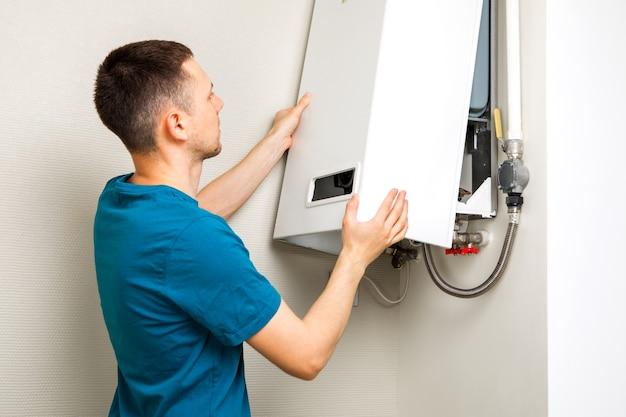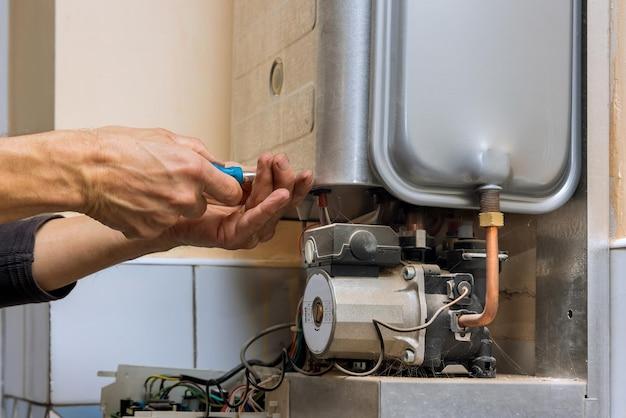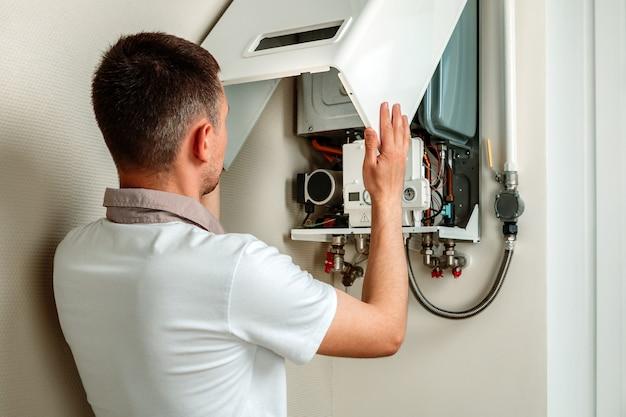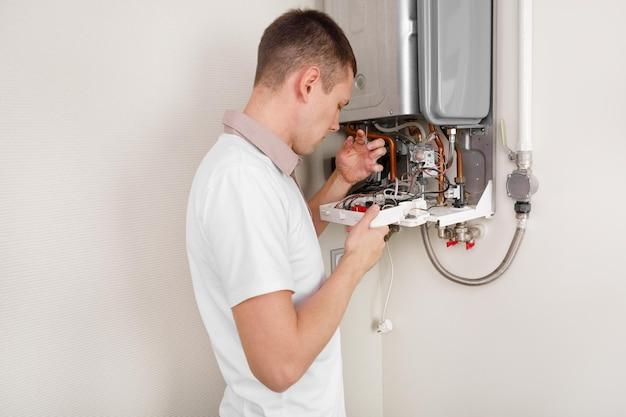Are you tired of high heating bills and looking for a more sustainable option? Look no further! In this blog post, we’ll explore the benefits and considerations of replacing your gas furnace with a heat pump. We’ll discuss the cost of a heat pump, its compatibility with an electric furnace, and whether it’s possible to make the switch from a gas furnace. By the end, you’ll have a clearer picture of whether a heat pump is the right choice for your home. So, let’s dive in and discover the world of heat pumps!
Replacing a Gas Furnace with a Heat Pump
Why Make the Switch
If you’re tired of expensive energy bills and want to reduce your carbon footprint, it’s time to consider replacing your gas furnace with a heat pump. Not only will you save money in the long run, but you’ll also be doing your part to protect the environment. So, let’s dive into the benefits of making this switch!
Energy Efficiency at Its Finest
One of the key advantages of a heat pump is its high energy efficiency. Unlike gas furnaces, which burn fuel to create heat, heat pumps transfer heat from the air or ground to warm up your home. This means they consume less energy, leading to significant savings on your monthly utility bills. Plus, many heat pumps come with energy-saving features like programmable thermostats, allowing you to customize your heating preferences and further optimize energy usage.
All-Season Comfort
Another perk of heat pumps is their ability to provide both heating and cooling throughout the year. That’s right – with just one system, you can keep your home cozy in winter and refreshingly cool in summer. Say goodbye to the hassle and expense of maintaining separate heating and cooling systems. A heat pump does it all, making it a convenient and economical choice.
Environmentally Friendly Heating
If you’re concerned about reducing your carbon footprint, a heat pump is the way to go. Unlike gas furnaces, heat pumps don’t emit any greenhouse gases since they don’t rely on combustion to generate heat. By switching to a heat pump, you’ll be using a clean and sustainable source of energy, helping to combat climate change and contribute to a greener future.
No More Risky Business
Oh, the joys of gas furnaces and their potential hazards! From gas leaks to carbon monoxide poisoning, they come with their fair share of risks. Heat pumps, on the other hand, operate without these risks, providing you with peace of mind. So, why worry about potential safety issues when you can switch to a heat pump and eliminate them altogether?
When it comes to replacing a gas furnace with a heat pump, the benefits are clear. From energy efficiency and all-season comfort to environmental friendliness and increased safety, heat pumps outshine their gas counterparts. So, why not make the switch and embrace a more sustainable and economical way of heating and cooling your home? Your wallet and the planet will thank you!
Heat Pump Cost
If you’re considering replacing your gas furnace with a heat pump, one of the important factors to consider is the cost. Let’s dive into the various aspects of heat pump costs so you can make an informed decision.
Installation Costs
When it comes to heat pump installation, you’ll need to consider both the upfront costs and the long-term savings. While the initial investment may be higher than a gas furnace, heat pumps can be more energy-efficient, leading to potential savings on your monthly utility bills. It’s crucial to weigh these factors when evaluating the overall cost.
Equipment Price
The price of a heat pump unit can vary based on factors such as the size of your home, the climate you live in, and the specific model you choose. It’s important to consult with a professional to determine the right size and specifications for your needs. Remember, finding the right balance between quality and cost is key.
Additional Costs
In addition to the equipment, there are a few other expenses to consider. You will need ductwork modifications or additions, which can add to the overall installation cost. Don’t forget about permits and inspections, which may be required depending on your location. It’s best to factor in these additional expenses to get a more accurate estimate.
Maintenance and Repairs
Just like any other HVAC system, heat pumps require regular maintenance to keep them running efficiently. Make sure to consider ongoing maintenance costs when assessing the overall cost of a heat pump. Additionally, it’s wise to set aside a budget for potential repairs that may arise over the years.
Return on Investment
While it’s true that replacing a gas furnace with a heat pump can come with an initial cost, it’s essential to consider the long-term savings you can enjoy. Heat pumps are known for their energy efficiency, which can result in lower monthly utility bills. Over time, the amount of money you’ll save on heating and cooling costs can contribute to a return on your investment.
When it comes to replacing a gas furnace with a heat pump, understanding the cost is crucial. From installation expenses to ongoing maintenance, considering the big picture will help you make the right choice for your home and your wallet. Remember to consult with professionals for accurate estimates and to weigh the potential savings against the upfront investment. With careful consideration, you can find a heat pump that suits your needs and budget while bringing you long-term comfort and efficiency.
Replace Gas Furnace with Electric
Why Consider Replacing Your Gas Furnace with an Electric System
Imagine a world where your home is cozy and warm without the constant worry of rising gas prices. Well, it’s not just a dream; replacing your gas furnace with an electric system can make it a reality! With the advancements in technology, electric systems have become incredibly efficient and environmentally friendly. But why should you consider making the switch? Let’s explore the top reasons to replace your gas furnace with an electric system.
Environmental Benefits of Electric Systems
One of the most compelling reasons to go electric is the positive impact it has on the environment. By opting for an electric system, you can reduce your carbon footprint and contribute to a cleaner and healthier planet. Unlike gas furnaces, electric systems produce zero direct emissions, making them an excellent choice for eco-conscious homeowners. So, not only will you be saving money on your energy bills, but you’ll also be doing your part to combat climate change.
Cost Savings and Efficiency
Say goodbye to those hefty gas bills and hello to cost savings! Electric systems have significantly higher energy efficiency ratings compared to gas furnaces. This means that they can effectively convert energy into heat, ensuring minimal wastage. Additionally, electric systems do not require the installation and maintenance of gas supply lines, resulting in further cost savings. So, not only are you reducing your environmental impact, but you’re also putting money back into your pocket.
Convenience and Safety
Who doesn’t love convenience? Electric systems come with a range of features that make them incredibly user-friendly. With programmable thermostats and remote control options, you can easily regulate the temperature of your home with just a few clicks. Electric systems also eliminate the risks associated with gas leaks and carbon monoxide poisoning, providing you and your family with a safe and secure heating solution.
The Future of Home Heating
With the world moving towards renewable energy sources, electric heating systems are undoubtedly the future of home heating. As renewable energy technologies continue to advance, the electricity used for heating will become increasingly environmentally friendly. By investing in an electric system today, you’re also future-proofing your home, ensuring that you stay ahead of the curve in energy-efficient technology.
Replacing your gas furnace with an electric system offers numerous benefits, including reduced environmental impact, cost savings, convenience, and safety. With the ever-increasing efficiency and advancements in renewable energy, it’s clear that electric systems are the way forward. So, why wait? Make the switch and enjoy a warm and cozy home while contributing to a sustainable future.
What is the downside to a heat pump
It’s not all sunshine and rainbows
So, you’re contemplating replacing your gas furnace with a heat pump, huh? Well, let me paint you a full picture of what you’re getting into. While heat pumps certainly have their benefits, they also have a few downsides you should be aware of. Don’t worry, I won’t rain on your parade too much, but a little drizzle might be in order.
Energy efficiency isn’t always a slam dunk
One of the big selling points of heat pumps is their energy efficiency. And it’s true, they can be much more efficient than gas furnaces, especially in moderate climates. However, in extreme cold or hot weather, their efficiency can take a hit. A heat pump relies on extracting heat from the outside air to warm your home, but when it’s freezing outside, there’s less available heat to extract. So, your heat pump might have to work harder or utilize an auxiliary heating source, which could increase your energy consumption and costs.
The upfront cost can make you break a sweat
While the long-term energy savings can be enticing, the initial cost of installing a heat pump can be a bit steep. Compared to a gas furnace, heat pumps tend to have a higher price tag. You’ll need to consider not only the cost of the unit itself but also the installation expenses, such as modifying your ductwork or adding a supplementary heat source. So, be prepared to do a little financial stretching before you can embrace the warmth of your new heat pump.
Noise levels that might tickle your eardrums
If you’re used to the peaceful hum of your gas furnace, a heat pump might introduce a new soundtrack to your home. Heat pumps can produce more noise, especially when operating in their cooling mode. The sound of the compressor and fans can be a bit louder than what you’re accustomed to. While it might not be a dealbreaker for some, it’s something to consider if you have a low tolerance for noise or if you prefer to keep your home library as serene as possible.
A cold breeze can send shivers down your spine
Remember when I mentioned that heat pumps extract heat from the outside air? Well, that means they also have the potential to blow cooler air into your home during the heating cycle. It’s not necessarily a problem, but it can be a bit of a shock if you’re used to the cozy warmth of a gas furnace. Some high-end heat pumps have features to mitigate this issue, like a two-stage compressor or a variable-speed fan, but it’s still worth noting that heat pumps may not always provide as toasty an experience as their gas-fueled counterparts.
Wrapping it up
So, there you have it—the downside to a heat pump. While heat pumps are a popular and efficient choice for many homeowners, they have their drawbacks. The decrease in energy efficiency during extreme weather, the higher upfront cost, the potentially noisier operation, and the possibility of cooler air blowing during heating cycles are all factors to consider before taking the plunge. But hey, every heating system has its quirks, right? It’s just a matter of finding what suits your needs best.
Heat Pump and Electric Furnace Combo
The Perfect Duo for Year-round Comfort
When it comes to heating and cooling your home, why settle for just one option when you can have the best of both worlds? With a heat pump and electric furnace combo, you can enjoy efficient heating in the winter and refreshing air conditioning in the summer. It’s like getting a two-in-one deal that will keep you cozy and cool all year round!
How Does It Work
The concept behind a heat pump and electric furnace combo is simple. The heat pump uses electricity to transfer heat between your home and the outdoor air. In the winter, it draws heat from the outside and brings it indoors to keep you warm. In the summer, it reverses the process, extracting heat from your home and releasing it outside to keep you cool.
But what if there’s a particularly cold snap in the winter? That’s where the electric furnace comes in. When the temperature drops to frigid levels, the electric furnace automatically kicks in to provide additional heating power. It’s like having a backup plan for those extra chilly days.
The Benefits of Combining Both Systems
So, why should you consider a heat pump and electric furnace combo? Well, besides the year-round comfort it provides, there are several other benefits to enjoy:
1. Energy Efficiency
By using electricity to transfer heat rather than creating heat directly, a heat pump is much more energy-efficient than traditional heating systems. Combining it with an electric furnace allows you to take advantage of the heat pump’s efficiency while having the backup of the electric furnace for extra warmth when needed.
2. Cost Savings
Because a heat pump is more efficient, it consumes less energy, which can lead to significant cost savings on your utility bills. Additionally, the electric furnace will only kick in when necessary, further optimizing your energy usage and saving you money in the long run.
3. Eco-Friendly Solution
Using electricity instead of burning fossil fuels, a heat pump and electric furnace combo is a greener alternative for heating and cooling your home. By reducing your carbon footprint, you can feel good about doing your part for the environment.
Is It Right for You
While a heat pump and electric furnace combo is an excellent choice for many homeowners, it may not be the perfect fit for everyone. Factors such as climate, existing ductwork, and budget should be considered before making a decision. It’s always a good idea to consult with a professional to determine the best solution for your home.
If you’re looking for an efficient, cost-effective, and eco-friendly solution for both heating and cooling, a heat pump and electric furnace combo could be the answer. With the ability to provide year-round comfort and significant energy savings, it’s a duo you won’t want to overlook. So, why settle for just one when you can have the best of both worlds? Upgrade to a heat pump and electric furnace combo today and enjoy the benefits of this ultimate heating and cooling powerhouse!
Can You Replace a Gas Furnace with a Heat Pump
If you’re tired of dealing with the hassle and expenses of a gas furnace, it’s time to consider making the switch to a heat pump. But you might be wondering, can you really replace a gas furnace with a heat pump? The answer is a resounding yes!
Understanding Heat Pump Basics
Before we dive into the nitty-gritty, let’s quickly grasp the basics of how a heat pump works. While a gas furnace generates heat by burning fuel, a heat pump extracts warmth from the air or ground and transfers it into your home. It’s like a magical system that can provide both heating and cooling functions! No more dealing with separate units for every season.
Financial Benefits of Heat Pump Conversion
Replacing your gas furnace with a heat pump can be a smart move financially. Heat pumps are incredibly energy-efficient, helping you save a significant amount on your utility bills. Additionally, some governments also offer incentives and tax credits for homeowners who choose to switch to more environmentally-friendly heating options. It’s a win-win for your wallet and the planet!
Compatibility Check
Before you get too excited about swapping out your gas furnace, it’s important to check the compatibility of your home and existing infrastructure. Although a heat pump can fit into most homes, certain factors need to be considered. Ensure that your home has good insulation, as the heat pump relies on maintaining a stable indoor temperature. Also, check if your electrical system can handle the additional load.
Ductwork Adjustment
If you already have a ducted system in place, adapting it for a heat pump will be relatively straightforward. A professional HVAC technician can guide you through making the necessary adjustments. However, if you have a ductless system or no ductwork at all, don’t worry! Heat pumps come in ductless options as well, allowing you to heat and cool specific zones in your home without the need for extensive ductwork.
The Finishing Touches
Once you’ve got your heat pump installed, the only thing left to do is to sit back, relax, and enjoy the comfort it brings. Remember to schedule regular maintenance and cleaning to keep your heat pump running smoothly for years to come. With its incredible energy efficiency, versatility, and eco-friendliness, replacing your old gas furnace with a heat pump is a no-brainer decision.
So, don’t wait any longer! Say goodbye to the hassle and expenses of your gas furnace and embrace the benefits of a heat pump. Upgrade your home heating and cooling system today and experience the ultimate comfort that a heat pump provides.
How Much Does It Cost to Switch from a Furnace to a Heat Pump
Switching from a gas furnace to a heat pump is an exciting prospect, but one of the biggest considerations is the cost. Let’s dive into the various factors that can impact the price of this transition and determine whether it’s worth the investment.
Upfront Costs
When it comes to upfront costs, there are a few significant factors to keep in mind. First and foremost is the price of the heat pump itself. Heat pumps can range in price depending on their efficiency, size, and features. On average, you can expect to pay between $3,500 and $6,500 for a quality heat pump, including installation.
Another expense to consider is the removal and disposal of your old gas furnace. Depending on the complexity of the task and the local labor rates, this can cost anywhere from $500 to $1,500.
Installation Expenses
Heat pump installation is not a DIY project. It requires professional expertise to ensure proper sizing, electrical connections, and ductwork modifications if necessary. Installation costs can vary based on the complexity of the job and the region you live in. On average, you can expect to spend between $2,000 and $5,000 for installation.
Energy Savings
While the upfront costs can be daunting, it’s essential to consider the long-term energy savings that come with a heat pump. Heat pumps are known for their energy efficiency, which can save you significant amounts on your monthly utility bills.
By switching from a gas furnace to a heat pump, you can reduce your heating costs by up to 50%. Over time, this can offset the initial investment, potentially putting money back in your pocket.
Additional Considerations
There are a few additional considerations that may add to the overall cost. For instance, if your home doesn’t have existing ductwork, you may need to factor in the cost of installing it. This can range from $2,000 to $5,000, depending on the size and complexity of your home.
Another factor to keep in mind is any necessary electrical upgrades. Heat pumps require a dedicated electrical circuit to operate efficiently. Depending on your home’s electrical system, this may require additional wiring and the installation of a new circuit breaker, which can cost around $500 to $1,000.
Is It Worth It
While the upfront cost of switching from a furnace to a heat pump may seem high, the long-term benefits often outweigh the investment. Not only will you see significant energy savings in the future, but you’ll also enjoy a more environmentally friendly heating and cooling solution.
Before making a decision, it’s always advisable to consult with HVAC professionals who can provide accurate estimates based on your specific circumstances. They can evaluate your home and help you determine the potential savings and payback period.
Ultimately, the decision to switch from a furnace to a heat pump is a personal one. However, considering the potential cost savings and the positive impact on the environment, it’s worth giving serious consideration.
So, put on your thinking cap, crunch those numbers, and decide if the switch is right for you!



